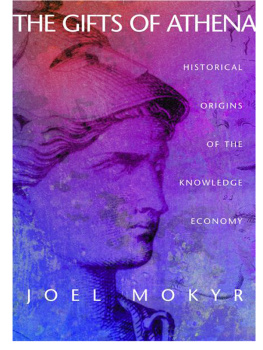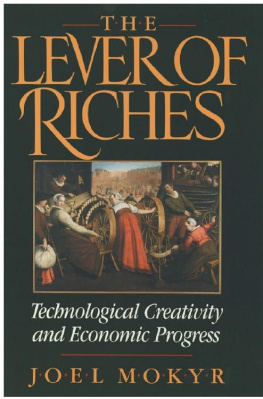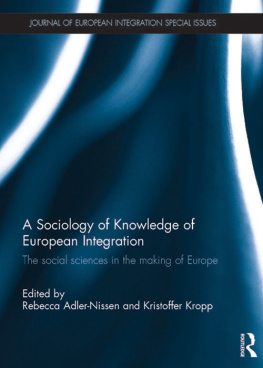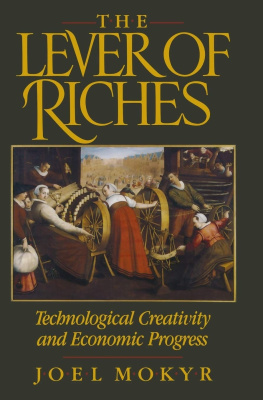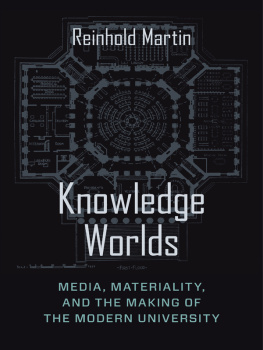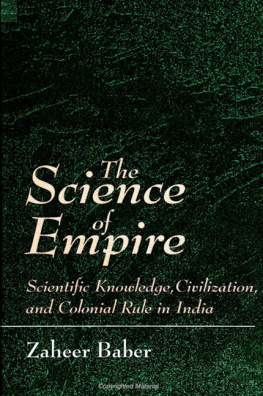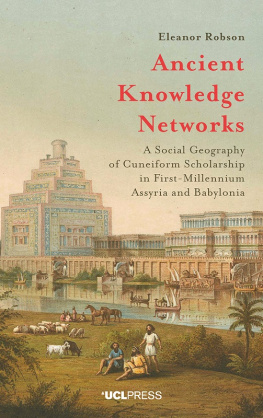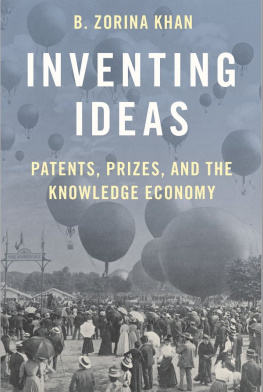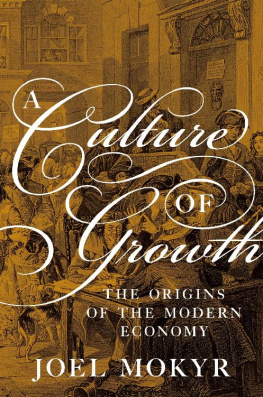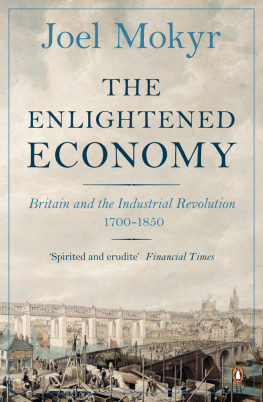Chapter 1
Technology and the Problem of Human Knowledge
Introduction
The growth of human knowledge is one of the deepest and most elusive elements in history. Social scientists, cognitive psychologists, and philosophers have struggled with every aspect of it, and not much of a consensus has emerged. The study of what we know about our natural environment and how it affects our economy should be of enormous interest to economic historians. The growth of knowledge is one of the central themes of economic change, and for that reason alone it is far too important to be left to the historians of science.
Discoveries, inventions, and scientific breakthroughs are the very stuff of the most exciting writing in economic history. In what follows, my approach relies heavily on the history of science, but it differs from much current writing in that it addresses squarely the issues of modern economic growth. Through most of human historyincluding the great watershed of the Industrial Revolutionnew knowledge appeared in a haphazard and unpredictable manner, and economic history is thus subject to similar contingencies. It therefore needs a special approach if it is to come to grips with modern economic growth, one that will take into consideration the untidy nature of the historical processes that created modern economic civilization of the past quarter-millennium.
In this book I am not explicitly concerned with modernization, a terms that has fallen on hard times. Economic modernization is associated with industrialization, yet economic performance improved in services and agriculture. This book does not consider such modernist trends as urbanization, the rise of a powerful and centralized state, the increase in political freedom and participation, and the growth in literacy and education. It starts from the basic and mundane observation that economic performance, our ability to tease out material comforts from niggardly nature, has improved immensely in the past two centuries.
The relationship between economic performance and knowledge seems at first glance obvious if not trite. Simply put, technology is knowledge, even if not all knowledge is technological. To be sure, it is hard to argue that differences in knowledge alone can explain the gaps in income between the prosperous West and poor nations elsewhere. If that were all that differed, surely knowledge would flow across boundaries. Yet nobody would seriously dispute the proposition that living standards today are higher than in the eleventh century primarily because we know more than medieval peasants. We do not say that we are smarter (there is little evidence that we are), and we cannot even be sure that we are richer than we used to be because we are better educated (although of course we are). The central phenomenon of the modern age is that as an aggregate we know more. New knowledge developed in the past three centuries has created a great deal of social conflict and suffering, just as it was the origin of undreamed-of wealth and security. It revolutionized the structures of firms and households, it altered the way people look and feel, how long they live, how many children they have, and how they spend their time. Every aspect of our material existence has been altered by our new knowledge.
But who is we? What is meant by a society knowing something, and what kind of knowledge really matters? For the economic historian, these propositions prompt further questions. Who knew that which was known? What was done with this knowledge? How did people who did not possess it acquire it? In short, the insights of economic theory need to be coupled with the facts and narratives of the history of science and technology.
Useful Knowledge: Some Definitions
I am neither qualified nor inclined to deal with the many subtleties of epistemology and cognitive science that a thorough treatment of knowledge as a historical force requires. Instead this book takes a simple and straightforward approach to knowledge and its role in technological and economic change. It asks how new knowledge helped create modern material culture and the prosperity it has brought about.
What kind of knowledge do I have in mind? My interest in what follows is confined to the type of knowledge I will dub useful knowledge. The term useful knowledge was used by Simon Kuznets (1965, pp. 85-87) as the source of modern economic growth. One could debate at great length what useful means. In what follows, I am motivated by the centrality of technology. Because technology in its widest sense is the manipulation of nature for human material gain, I confine myself to knowledge of natural phenomena that exclude the human mind and social institutions. Jewish tradition divides all commands into commands that are between a person and makom (literally place, but actually the deity) and between a person and chavayro (other people). In epistemology such distinctions are hazardous, yet it seems to me that roughly speaking there is a kind of knowledge accumulated when people observe natural phenomena in their environment and try to establish regularities and patterns in them. This knowledge is distinct from knowledge about social facts and phenomena. To be sure, a great deal of important knowledge, including economic knowledge, involves people and social phenomena: knowledge about prices, laws, relationships, personalities, the arts, literature, and so on. I should add right away that some technologies are based on the regularities of human behavior (e.g., management science and marketing) and therefore might be considered part of this definition. It could also be argued that economic knowledge (e.g., about prices or rates of return on assets) should be included, as it is necessary for efficient production and distribution. Despite some gray areas, in which the two overlap, I shall maintain this definition. Hence useful knowledge throughout this book deals with natural phenomena that potentially lend themselves to manipulation, such as artifacts, materials, energy, and living beings.
Economists often make a distinction between the growth of the stock of useful best-practice knowledge and its effective diffusion and utilization by all economies that have access to it. Their work is concerned with the latter; what follows is primarily about the former. The complementarity between the two is obvious. The idea that changes in useful knowledge are a crucial ingredient in economic growth seems so self-evident as to make elaboration unnecessary, were it not that with some notable exceptionsespecially the work of the Stanford school embodied in the work of Nathan Rosenberg and Paul Davideconomists rarely have dealt with it explicitly. Even the New Growth Theory, which explicitly tries to incorporate technology as one of the variables driven by human and physical capital, does not try to model the concept of useful knowledge and its change over time explicitly. Much in the tradition of A. P. Usher (1954), what I propose here is to look at technology in its intellectual context.
A Theory of Useful Knowledge
Useful knowledge as employed throughout the following chapters describes two types of knowledge. One is knowledge what or propositional knowledge (that is to say, beliefs) about natural phenomena and regularities. In what follows, I refer to propositional knowledge as Q-knowl- edge and to prescriptive knowledge as A-knowledge. If Q is episteme, X is techne. This distinction differs in important respects from the standard distinctions between science and technology that have produced a vast literature but has increasingly come under scrutiny. It is also different from the distinction between theory and empirical knowledge.
Who are the people who know? Knowledge resides either in people's minds or in storage devices (external memory) from which it can be retrieved. Similarly, I will refer to the union of all the techniques known to members of society or in accessible storage devices as the set
Next page
